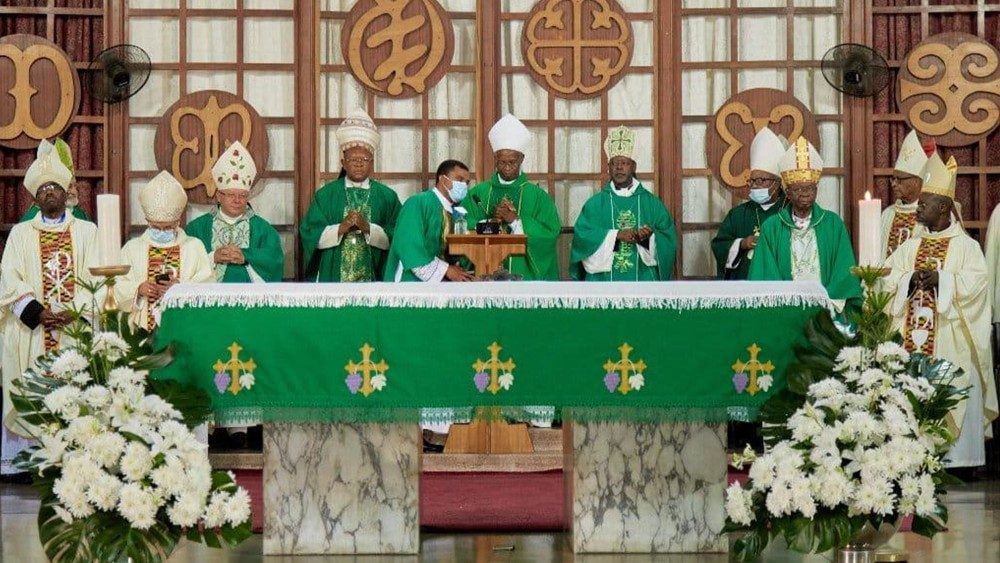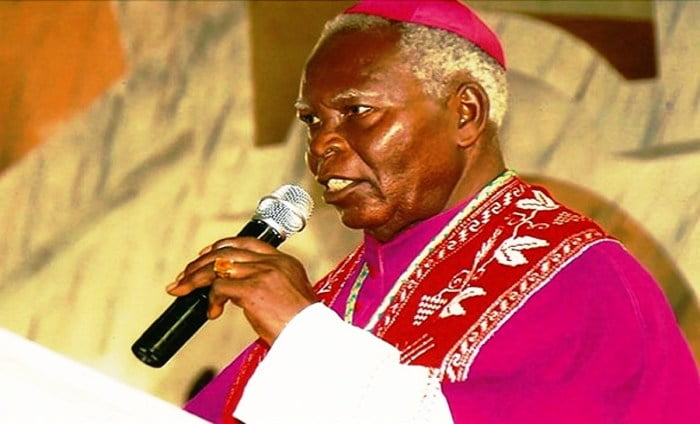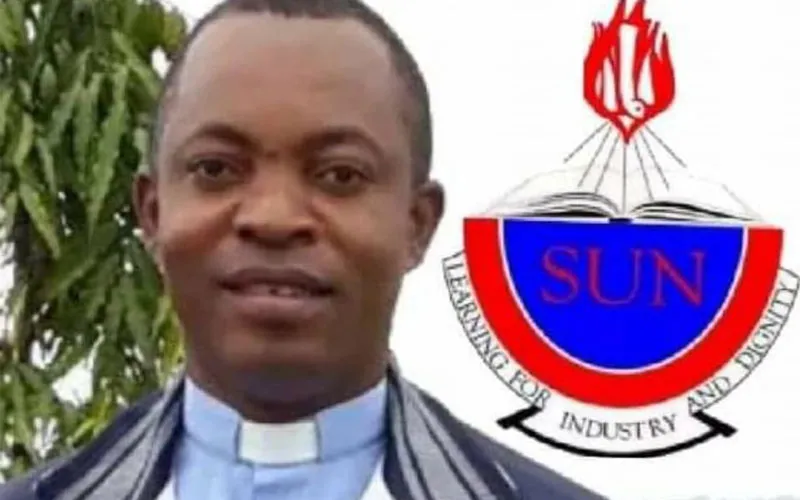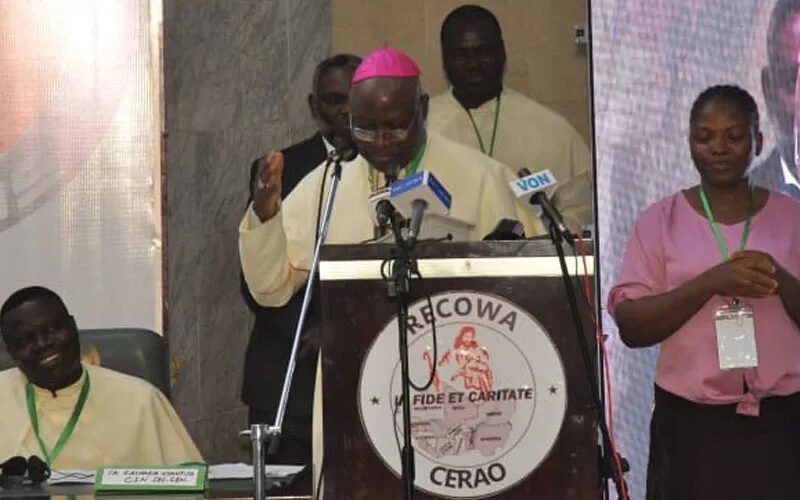L’appropriation du SCEAM
«Le SCEAM est l’organe de solidarité pastorale de l’Eglise en Afrique et à Madagascar», soulignent les évêques dans le premier point de leur message final. Ils évoquent l’urgence pour cette instance continentale de devenir autosuffisante financièrement et matériellement, par l’engagement concret de tous ses membres. Pour cela, ils invitent les membres de l’Église d’Afrique à plus d’engagement et à s’identifier à la mission du SCEAM, pour la mission de l’évangélisation, tâche principale de l’Église, en marchant sur la voie de la sainteté.
L’insécurité, une menace pour la stabilité et le développement des pays africains
Parlant d’insécurité sur le continent, les évêques africains pointent la grande insécurité que connaissent certaines régions du continent, une situation unique causée par « l’instabilité sociopolitique, la violence, la pauvreté, la faiblesse des structures de santé, l’insurrection, le terrorisme, l’exploitation religieuse de la religion à des fins politiques et le non-respect de l’environnement et de la bonne gouvernance ». Ils rappellent aux acteurs sociopolitiques et décideurs en Afrique leur lourde responsabilité et les exhortent à tout mettre en œuvre pour lutter contre l’insécurité et participer à la consolidation de la paix. Ils invitent les filles et les fils du continent à prêter attention aux situations d’insécurité et à travailler ensemble pour trouver des solutions à leurs problèmes.
Ils rappellent également le rôle prophétique de l’Église, qui consiste notamment à dénoncer toute situation d’insécurité et ses causes ; tout en continuant à donner des raisons d’espérer.
« L’Église et les personnes en situation de migration »
Abordant le troisième point sur la migration, le SCEAM rappelle que la migration est un phénomène social normal, associé à l’histoire humaine ; ce qui peut avoir plusieurs raisons. L’article 13 de la Déclaration universelle des droits de l’homme en fait un droit. Même si elle est peu fréquente, la migration ne peut être considérée comme illégale. Cependant, elle peut être associée à des souffrances, notamment “l’abus de statut social par les migrants, l’exploitation, l’ignorance et l’aporophobie (peur de la pauvreté)”, observent les juges.
Tout en exprimant la douleur de voir des jeunes quitter leur pays, sachant qu’ils souffriront et éventuellement perdront la vie, les évêques invitent les dirigeants à définir les structures et les conditions qui les empêchent de migrer irrégulièrement. Ils exhortent les futurs migrants à ne pas perdre espoir et à respecter les normes migratoires. Le SCEAM appelle également « les communautés chrétiennes à développer une pastorale active des migrants qui se décline en quatre étapes d’action : accueillir, protéger, promouvoir et rencontrer l’import ».
Synodalité et communication
Les évêques d’Afrique ont également envisagé la synodalité, déclarant que la phase continentale sera célébrée en mars 2023. Dans les lignées de l’encyclique Laudato si et Fratelli tutti du pape François, ils appellent à écouter le cri des pauvres et en la lutte contre le changement climatique. Ils restent également déterminés à promouvoir le dialogue interreligieux et l’œcuménisme à travers le continent. Ils se sont engagés à soutenir le monde des médias, tout en renforçant la formation éthique et technique des professionnels des médias.
The 19th Plenary Assembly of the Symposium of Episcopal Conferences of Africa and Madagascar (SECAM) was held from July 25 to August 1 in Accra, Ghana around the theme: “Ownership of SECAM: security and migration in Africa and the islands “. The final resolutions and messages of the bishops return to five key points: the appropriation of SECAM, security, migration, communication and synodality.
The appropriation of SECAM
“SECAM is the organ of pastoral solidarity of the Church in Africa and Madagascar”, underline the bishops in the first point of their final message. They evoke the urgency for this continental body to become financially and materially self-sufficient, through the concrete commitment of all its members. For this, they invite the members of the Church in Africa to more commitment and to identify with the mission of SECAM, for the mission of evangelization, the main task of the Church, walking on the path of holiness.
Insecurity, a threat to the stability and development of African countries
Speaking of insecurity on the continent, the African bishops point to the great insecurity experienced by certain regions of the continent, a unique situation caused by “socio-political instability, violence, poverty, weak health structures, insurrection, terrorism, the religious exploitation of religion for political ends and disrespect for the environment and good governance”. They remind socio-political actors and decision-makers in Africa of their heavy responsibility and urge them to do everything possible to fight against insecurity and participate in the consolidation of peace. They invite the daughters and sons of the continent to pay attention to situations of insecurity and to work together to find solutions to their problems.
They also recall the prophetic role of the Church, which consists in particular in denouncing any situation of insecurity and its causes; while continuing to give reasons for hope.
“The Church and People in a Migratory Situation”
Addressing the third point on migration, SECAM recalls that migration is a normal social phenomenon, associated with human history; which can have several reasons. Article 13 of the Universal Declaration of Human Rights makes it a right. Even if it is infrequent, migration cannot be considered illegal. However, it can be associated with suffering, including “abuse of social status by migrants, exploitation, ignorance and aporophobia (fear of poverty)”, observe the judges.
While expressing the pain of seeing young people leaving their country, knowing that they will suffer and possibly lose their lives, the bishops invite leaders to define the structures and conditions that prevent them from migrating irregularly. They urge future migrants not to lose hope and to respect migration standards. SECAM also calls on “Christian communities to develop an active pastoral care of migrants which can be broken down into four stages of action: welcoming, protecting, promoting and meeting the import”.
Synodality and communication
The bishops of Africa have also considered synodality, declaring that the continental phase will be celebrated in March 2023. In line with the encyclical Laudato si and Fratelli tutti of Pope Francis, they call to listen to the cry of the poor and in the struggle against climate change. They also remain committed to promoting interfaith dialogue and ecumenism across the continent. They are committed to supporting the world of media, while strengthening the ethical and technical training of media professionals.
A 19ª Assembleia Plenária do Simpósio das Conferências Episcopais de África e Madagáscar (SECAM) decorreu de 25 de julho a 1 de agosto em Accra, Gana, em torno do tema: “A propriedade do SECAM: segurança e migração em África e nas ilhas”. As resoluções finais e mensagens dos bispos voltam a cinco pontos principais: a apropriação do SECAM, segurança, migração, comunicação e sinodalidade.
A apropriação do SECAM
“O SECAM é o órgão de solidariedade pastoral da Igreja na África e em Madagascar”, sublinham os bispos no primeiro ponto de sua mensagem final. Eles evocam a urgência de que este corpo continental se torne financeira e materialmente auto-suficiente, através do compromisso concreto de todos os seus membros. Para isso, convidam os membros da Igreja na África a um maior empenho e identificação com a missão do SECAM, para a missão de evangelização, tarefa principal da Igreja, trilhando o caminho da santidade.
Insegurança, uma ameaça à estabilidade e ao desenvolvimento dos países africanos
Falando da insegurança no continente, os bispos africanos apontam para a grande insegurança vivida por certas regiões do continente, uma situação única causada pela “instabilidade sócio-política, violência, pobreza, estruturas sanitárias débeis, insurreição, terrorismo, exploração religiosa de religião para fins políticos e desrespeito ao meio ambiente e boa governança”. Recordam aos actores sócio-políticos e decisores em África a sua grande responsabilidade e exortam-nos a fazer todo o possível para lutar contra a insegurança e participar na consolidação da paz. Convidam as filhas e os filhos do continente a prestar atenção às situações de insegurança e a trabalhar em conjunto para encontrar soluções para os seus problemas.
Recordam também o papel profético da Igreja, que consiste sobretudo em denunciar qualquer situação de insegurança e as suas causas; continuando a dar razões de esperança.
“A Igreja e o Povo em Situação Migratória”
Ao abordar o terceiro ponto sobre migração, o SECAM lembra que a migração é um fenômeno social normal, associado à história humana; que pode ter vários motivos. O artigo 13 da Declaração Universal dos Direitos Humanos o torna um direito. Mesmo que seja pouco frequente, a migração não pode ser considerada ilegal. No entanto, pode estar associado ao sofrimento, incluindo “abuso de status social por parte dos migrantes, exploração, ignorância e aporofobia (medo da pobreza)”, observam os juízes.
Enquanto expressam a dor de ver os jovens deixando seu país, sabendo que sofrerão e possivelmente perderão a vida, os bispos convidam os líderes a definir as estruturas e condições que os impedem de migrar irregularmente. Exortam os futuros migrantes a não perderem a esperança e a respeitarem os padrões de migração. O SECAM também exorta “as comunidades cristãs a desenvolverem uma pastoral ativa dos migrantes que pode ser dividida em quatro etapas de ação: acolher, proteger, promover e atender a importância”.
Sinodalidade e comunicação
Os bispos da África também consideraram a sinodalidade, declarando que a fase continental será celebrada em março de 2023. Em consonância com a encíclica Laudato si e Fratelli tutti do Papa Francisco, eles chamam a ouvir o clamor dos pobres e na luta contra das Alterações Climáticas. Eles também permanecem comprometidos em promover o diálogo inter-religioso e o ecumenismo em todo o continente. Eles estão comprometidos em apoiar o mundo da mídia, ao mesmo tempo em que fortalecem a formação ética e técnica dos profissionais de mídia.
- RECOWA-CERAO WELCOMES TWO NEW BISHOPS - July 26, 2024
- TODAY WE ARE TAKING UP THE THIRD SEGMENT IN OUR SERIES - July 26, 2024
- CHARACTERISTICS OF GREAT LEADERS SHARED BY A USA AUTHOR - July 25, 2024







